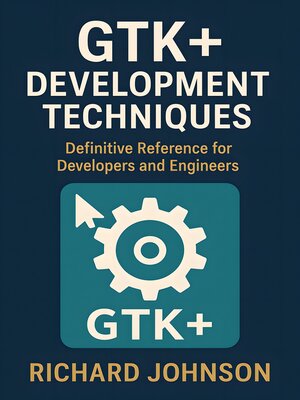GTK+ Development Techniques
ebook ∣ Definitive Reference for Developers and Engineers
By Richard Johnson

Sign up to save your library
With an OverDrive account, you can save your favorite libraries for at-a-glance information about availability. Find out more about OverDrive accounts.
Find this title in Libby, the library reading app by OverDrive.



Search for a digital library with this title
Title found at these libraries:
| Library Name | Distance |
|---|---|
| Loading... |
"GTK+ Development Techniques"
"GTK+ Development Techniques" delivers a comprehensive, modern exploration of the GTK+ toolkit, equipping software professionals with both foundational knowledge and advanced strategies for desktop application development across Linux, Windows, and macOS. From the evolution of GTK+ and its close integration with the GObject type system and GLib, to granular memory management, threading, and event-driven architecture, this book offers an authoritative guide to building robust, efficient, and responsive user interfaces. Readers will gain a deep understanding of core internals, including the signal system, lifecycle management, and state-of-the-art concurrency practices, empowering them to create sophisticated cross-platform applications.
The book systematically addresses every essential dimension of GTK+ programming, with extensive coverage of widget hierarchies, data modeling, and Model-View-Controller design patterns, complemented by practical guidance on internationalization and accessibility. Step-by-step chapters outline advanced customization through CSS theming, drawing and graphics via Cairo and OpenGL integration, dynamic event handling, and responsive multimedia interfaces. Real-world techniques for integrating external data, managing asynchronous updates, ensuring portability across windowing systems, and leveraging device-specific APIs ensure that developers can deliver seamless end-user experiences.
Recognizing the critical importance of performance, extensibility, and security, "GTK+ Development Techniques" highlights state-of-the-art profiling, debugging, automation, and deployment methodologies. Coverage extends to plugin architectures, scripting, safe resource management, sandboxing, and future-proofing applications within the evolving GNOME ecosystem. Whether you are modernizing legacy software or designing the next generation of cross-platform desktops, this book is an indispensable reference for mastering GTK+ development at an expert level.







